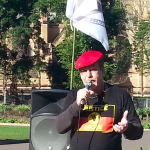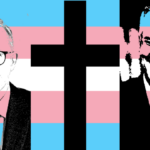Decriminalise Queensland Sex Work: An Interview With Respect’s Janelle Fawkes

Amnesty International adopted a sex work decriminalisation policy back in 2016. It was a move that formally recognised the high rates of human rights abuses in the industry, as well as that many of the harms associated with sex work are due to its criminalisation.
NSW decriminalised the sex industry in 1995, with the passing of the Disorderly Houses Amendment Bill (NSW). In 2016, a state government review of the laws found that decriminalisation is “the best way of protecting sex workers and maintaining a more transparent sex work industry”.
Decriminalising this state’s industry led to improved health outcomes for sex workers, increased access to peer support services, and a reduction in police corruption. This followed the Wood Royal Commission’s finding that police were inappropriate regulators of the NSW sex industry.
And along with this state, New Zealand is the only other jurisdiction in the world to have decriminalised its sex industry. Although, South Australia looks set to follow with a decriminalisation bill having just passed through the upper house of state parliament a few weeks ago.
Enhanced criminalisation
It’s been 30 years since the Fitzgerald Inquiry into Queensland Police Corruption tabled its final report. And despite the investigation finding that the sex work industry should be treated like any other and be released from police control, today, the policing of workers has only increased.
The subsequent passing of the Prostitution Act (Qld) in 1999 was supposed to rectify the issue by legalising brothels and independent work. But, the real outcome was it increased the criminalisation of the overwhelming majority of the industry.
It’s hard to believe that in 2019 it’s still routine for Queensland police officers to try and entrap sex workers as they’re going about their business. Indeed, the system is so antiquated that police enforce laws that punish sex workers for partaking in safety strategies.
And the outcome of all this is that sex workers still have to hide in the shadows, as they face actively encouraged police harassment, as well as the inability to report crime against them for fear of being arrested whilst seeking protection.
The support of their own
Respect Inc is a peer-based organisation focused on protecting and promoting the rights of sex workers in Queensland. Established in 2007, Respect’s support network is based on the premise that sex worker health and safety education has always been successfully peer-led.
DecrimQld is a campaign run be Respect that’s calling on the state government to decriminalise the industry, as well as increasing awareness around the broken prohibition laws. And with the state government finally turning its attention towards the industry, reform could soon be on its way.
Sydney Criminal Lawyers spoke to DecrimQld campaign leader Janelle Fawkes about the harms associated with the criminalisation of sex work, how the state brothel licensing scheme has been a failure and why local sex workers are left with a choice between working safely or legally.
Firstly, legislation passed in 1999 created a brothel licensing system in Queensland. This led to the legalisation of working in a licensed brothel, as well as working alone. However, this system is inadequate, and in fact, it’s led to further criminalisation within the industry.
Janelle, why are the laws regulating sex work in Queensland so problematic?
When the Fitzgerald Inquiry report came out, it recognised that the sex industry was made up of many different business models. And by that, I mean, there are brothels, massage parlours, escort agencies, private workers working together and small co-ops.
The 1999 licensing act took a one-size-fits-all approach, because it only allowed for a certain type of brothel to be licensed. So, effectively, that legislation made all of those other sex industry models illegal. And as such, we have more than 80 percent of the industry operating outside of the legal framework in Queensland.
On top of that, chapter 22A of the Criminal Code (Qld) criminalises sex worker safety strategies. For example, calling another sex worker to let them know that your client’s arrived or when they’ve left, having a receptionist that organises your bookings, using a driver that another sex worker uses, and of course, working in pairs, doing double services and being on the same premises as another sex worker is criminalised.
So, obviously, that’s problematic for a range of reasons. If our safety strategies are criminalised, it increases the likelihood that we’ll experience problems in our work.
As you’ve mentioned, many aspects of the industry are criminalised. How does this affect sex workers?
Our advertising is criminalised. It’s not legal to advertise your services in Queensland. You can advertise, but you can’t advertise your services or other aspects of you or your work.
And any type of small business has to be able to advertise effectively and wants to be able to match up the services that they provide to the people that are seeking that same type of service. These are barriers to sex work operating effectively in Queensland.
But, the real everyday experience for sex workers as individuals is, we have to choose between working safely and legally. If we choose to work safely, then we risk fines and arrest.
In the 2016-17 police stats, it showed a 450 percent increase in charges. And a lot of those charges were related to advertising infringements.
What happens with the policing in Queensland is that police identify something wrong with the wording of our advertisements, and that allows them to get approval to go undercover and to make a booking with us posing as a client.
And once they are at our place, it’s not a nice experience. You are there in your work wear and you’re interacting with a person as if they’re a client, only to find out at some point that in fact they’re a police officer.
They use our mobile phone and laptops to identify that we have been communicating with another sex worker, or another person, about our work. And that might even be somebody helping us to write our advertising text, getting our partner to put our advertising in or using those basic safety strategies.
That then increases the charge to knowingly participating in the provision of prostitution. And along with the seizure of your money, your laptop and your phone, there can be a fine of up to $6,000.
It’s a horrendous impact. And most of us feel like we’re watching over our shoulder all the time, not really sure when it’s going to be our turn. It’s not a great experience.
But, the main impact it has on us is as sex workers we don’t report crime. If we experience robbery, or fraud, harassment, or even violence in our work, workplace or our personal lives, we don’t report it to police.
This is because many other sex workers have tried and their reports are not taken seriously, as well as the fact that it would be making us known to police and therefore, knowing that we would likely experience further surveillance. And for Asian and migrant sex workers that could include deportation.
Police don’t really play a good dual role. When they are the prosecutors, they’re not able to play the role of protector as well. And that’s definitely the case in Queensland.
You’re talking about the police entrapping sex workers. How prevalent is that?
It’s a regular occurrence. You can search on Google. Sex worker charges come up and you will find a large number of them describing the practice of entrapment using advertising and identifying a charge that fits the knowingly participating provision of prostitution.
Police have taken to interpreting that very broadly. The legislation itself is broad. It is somebody that has a direct or indirect role in enabling sex work.
But, from reading back through Hansard, the current interpretation of that charge is much broader than its intention. There was an intention for that to provide some protection for sex workers. But, the police stats show very clearly that its sex workers who are being charged.
You’ve also talked about how these laws and entrapment scenarios are impacting massage parlours. Can you tell us a bit about that?
There’s a big focus on massage parlours at the moment. And there’s this misconception that they’re somehow exploitative situations, where workers are working in lesser conditions than the 20 licensed brothels that exist throughout the state.
That’s the problem with those 1999 changes: the one-size-fits-all approach. The brothel licensing authority has cost more than $10 million since its inception. And the idea was that the cost of that would be covered by licensing fees.
But, it has only managed to license a very small percentage of brothels. Now, there’s only 20 in total: 19 in southeast Queensland and one in Cairns. And the government still has to top up the licensing authority cost by $700,000+ per year.
What it means is that all of those other sex industry business models that are not able to be part of the licence system are also left to operate outside of it. It’s not because they necessarily don’t want to participate in that system, but there is no way for a massage parlour to gain a licence within it.
In NSW, there are councils that recognise different types of industry models. And in that state, they are regulated in the same way as any other business. And that has led to an acceptance that all of those different business models have a place within the industry.
You’ve mentioned several times that basic safety measures are criminalised. Why is that the case?
I couldn’t answer that. We don’t know why sex worker safety strategies in Queensland are criminalised. It’s a horrendous situation that any workforce would have their safety strategies criminalised.
But, particularly, as you’re pointing out, there’s no logic behind why that would happen. No one is being protected by that. There’s no benefit to the community. The only real outcome is that sex workers in Queensland are really under high levels of policing and needlessly unable to work safely.
It’s been three decades since the Fitzgerald Inquiry recommended that a civil approach be taken to the sex industry in Queensland. Do police in your state have more powers these days over the industry than they did back then?
A colleague of mine, Candi Forrest, presented on this same issue last week in Brisbane. She was around pre and post-Fitzgerald working as a sex worker. And she states very clearly that in many ways things have got worse: the police presence and police action against sex workers has definitely increased.
One of the other things that the Fitzgerald Inquiry recommended was that police be removed from their role of regulating the sex industry and it also stated very clearly that the police at the time were advocating for a continuation of specialised police units.
The Fitzgerald report states that should not occur. It found nothing to support that continuing. However, in Queensland, 30 years later, we still have a specialised police unit called PETF or the Prostitution Enforcement Task Force. Its job is to police sex work.
The recommendations and the outcomes of the Fitzgerald Inquiry have never been realised. And, in fact, we’re a workforce of people who remain under police surveillance, harassment and we’re likely to be charged whenever we work.
As I say, the situation is individual sex workers have to choose between working safely or legally, which is completely unacceptable in 2019.
You’ve got police enforcing laws that are dangerous for sex workers, while just across the border in NSW sex work is decriminalised. How does this sit with sex workers in Queensland?
We’ve certainly looked at the evidence from the versions of decriminalisation in NSW and New Zealand. We’ve looked at the evidence from the outcomes in those jurisdictions.
Some of the things that have come out of that, we’re clearly envious of. There’s been an improvement in occupational health and safety for sex workers. Sex workers in New Zealand are 70 percent more likely to report crime to police than prior to decriminalisation.
The size of the industry hasn’t increased. And many of those kinds of hysterical concerns about what might happen if the industry was decriminalised have not been realised in either jurisdiction.
But, it certainly is the case that the situation of police being in control of the industry has changed.
And what comes with sex workers no longer being criminals or forever having to look over our shoulders in doing our day-to-day work is we’re able to report crime and we feel like we have the same rights and responsibilities as other people in the community.
If you like, we are brought out from underground. And we are able to contribute and participate in the community in the same way as anybody else.
It definitely has a direct impact on stigma and discrimination. and that extends to having an impact on public health, mental health and sex workers general wellbeing, when we’re no longer seen as criminals.
You’re a member of peer-based sex worker rights organisation Respect Inc. Can you outline what sort of work Respect carries out?
Respect is an organisation that provides a broad range of services to sex workers throughout the state. Respect has offices in Brisbane, the Gold Coast, Townsville and Cairns.
So, it’s a statewide organisation, made up of sex workers. And a lot of our services are community development, health promotion, and support. We do a whole range of workshops and a career development program. It’s an extensive range of services.
And what about DecrimQld?
DecrimQld is a committee of sex workers from around the state that have joined together with Respect Inc, in order to participate in a focused campaign to change the laws and have the industry decriminalised.
And lastly, Janelle, the Queensland attorney general and police minister were in discussions about decriminalising the local industry in October last year. What’s the situation like regarding decriminalising sex work in Queensland at present?
It’s now government policy to decriminalise the sex industry. The process would be sending it to the Queensland Law Reform Commission for consideration and an independent report.
And we feel confident that the evidence shows clearly that decriminalisation addresses many of the current problems with the sex industry.
We await the announcement that it’s happening. And we note that the government’s commitment was to take that action within this term of government. So, time is running out and we need leadership and action quickly.







